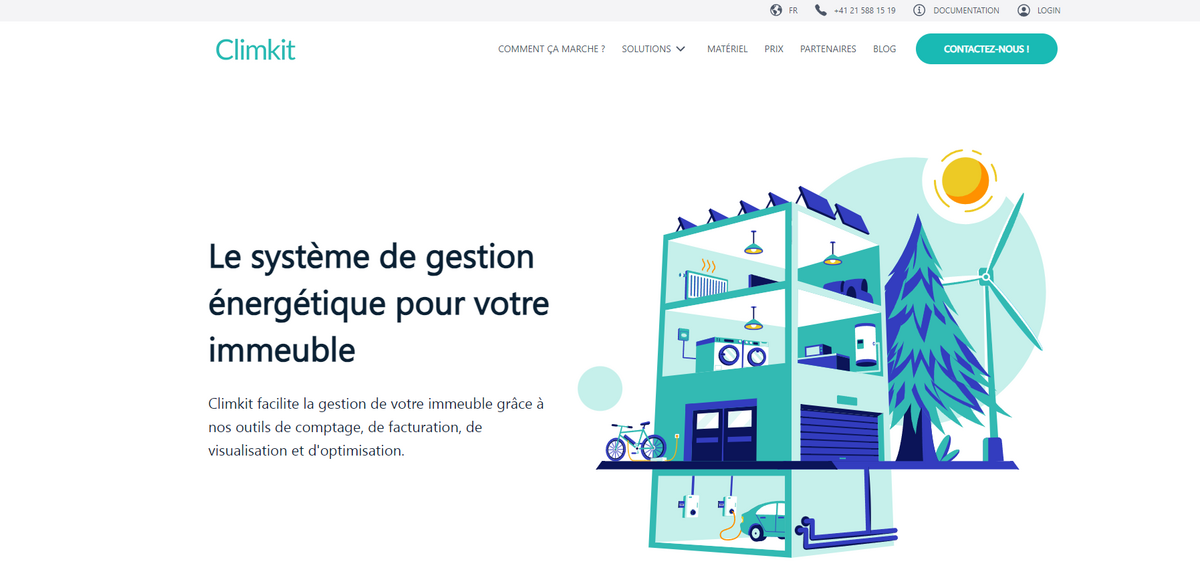What is the Climkit Project?
Climkit is the ENERGY MANAGEMENT SYSTEM FOR YOUR BUILDING that facilitates efficient building management through advanced tools for metering, billing, visualization, and optimization. Designed with the consumer and owner in mind, Climkit brings together technologies for electrical metering, RCP, charging stations, heating and water billing, laundry management, and more. The solution caters to real estate owners with photovoltaic installations, enabling them to distinguish clearly between solar-generated and grid electricity used by residents. It is a unique service that has been developed reliably and cost-effectively to meet the demands of solar communities, allowing building owners to sell generated power directly to their tenants… the integration of these features makes Climkit a comprehensive energy management package.
Main Benefit
Climkit offers a range of benefits that are key figures and facts driving its adoption:
- Modular solutions specifically tailored for electrical metering, RCP, charging stations, and more.
- Automated billing management with metering, reminders, receipts, and payment handling for energy suppliers.
- Real-time monitoring and visualization through an online portal and mobile applications.
- Seamless separation of solar and grid electricity consumption, ensuring accurate billing for every consumer.
- Optimization of energy use by controlling devices like water heaters, AC, and EV chargers based on available solar energy.
Billing Management and Energy Consumption
The billing and invoicing process in Climkit is meticulously designed to handle all financial flows. With real-time data retrieved from meters and charging stations, each resident’s consumption is tracked and an individualized consumption statement is automatically prepared at regular intervals. This system manages electricity, vehicle charging, and even laundry usage, ensuring that every resident receives a unique invoice that consolidates their energy usage. Furthermore, Climkit competently handles the invoice from the local electricity supplier, which is then settled with the owner. This streamlined billing approach not only minimizes administrative overhead but also ensures accuracy and transparency in every transaction.
Visualization, Monitoring and User Access
Climkit enhances energy management through a comprehensive online portal complemented by a mobile application. Both owners and residents have personalized access depending on the chosen service, making it easy to track consumption and production in real time. Owners or administrators benefit from advanced features like monitoring the proper functioning of photovoltaic installations, receiving immediate alerts on any issues, tracking payment statuses, and even downloading consumption data via CSV and API. Meanwhile, consumers can easily distinguish their solar electricity consumption from that provided by the grid; they can check the invoice history anytime and even track the energy used while charging their electric vehicles. It’s an accessible, dynamic, and user-friendly system that supports everyday energy management challenges.
Optimization for Energy Self-Consumption
In today’s sustainability-focused landscape, optimization has become critical. Climkit’s energy management algorithms work intelligently to make buildings more autonomous while keeping investment costs low. The system maximizes self-consumption by selectively activating devices such as heating systems, electric vehicle chargers, pool pumps, and more during periods of excess photovoltaic production. Additionally, the solution instantly adjusts the power output of charging stations in the parking lots, reducing charging time without straining the building’s overall connection capacity. This proactive energy management approach eliminates the need for battery storage by effectively storing energy through immediate use, a method both innovative and highly effective in reducing grid dependence.
Project Impact on Sustainability
- SDG 7: Affordable and Clean Energy – by ensuring efficient energy management and billing accuracy.
- SDG 11: Sustainable Cities and Communities – through optimized energy self-consumption and reduced grid dependency.
- SDG 13: Climate Action – by promoting renewable energy use and minimizing energy waste.
- SDG 9: Industry, Innovation and Infrastructure – thanks to the modern integration of metering, billing, and optimization technologies.
Additional Insights on Climkit Solutions
Climkit’s approach to energy management in buildings emerges as a well-rounded solution that combines reliable metering, precise billing, and intelligent optimization techniques. The system’s capability to transmit all collected data to an online portal where statements and invoices are generated is seamlessly integrated with both desktop and mobile platforms. It’s a solution that not only caters to the technological needs of modern energy management but also makes the process accessible and dynamic through real-time monitoring. The subtle, yet effective, methods of controlling water heaters, air conditioning, and electric vehicle chargers based on available solar energy showcase how everyday energy use can be transformed and managed with remarkable efficiency. In essence, Climkit stands out as an optimal and comprehensive tool for both energy providers and consumers, truly embodying the future of distributed energy management.





















